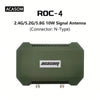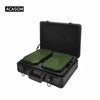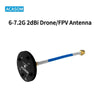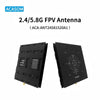Why do we recommend our drone signal boosters?
In the rapidly growing field of drone technology, one of the most critical challenges is ensuring reliable and uninterrupted communication between drones and their operators. This communication is vital for the success of various drone applications, including commercial deliveries, aerial surveying, agriculture, and military operations. To address this challenge, drone signal boosters have emerged as essential tools to enhance connectivity, extend range, and improve overall performance.
In this article, we will explore the advantages of using drone signal boosters, the technology behind them, and how they can optimize drone operations. Whether you're a drone enthusiast, a business utilizing drones, or a professional in the unmanned aerial vehicle (UAV) industry, understanding the benefits of signal boosters will help you leverage the full potential of your drone fleet.
What is a Drone Signal Booster?
A drone signal booster is a device designed to amplify or extend the signal between a drone and its remote controller or ground station. These boosters work by increasing the range and strength of the communication link, overcoming environmental obstacles, and ensuring a stable connection even in challenging conditions. The booster typically amplifies radio frequencies (RF) used by the drone for control signals, telemetry data, and video streaming.
Drone signal boosters can be used in various scenarios, such as long-range flights, flights over obstructed terrain, or in areas with high electromagnetic interference (EMI). They are becoming indispensable for professionals who need to ensure continuous, reliable drone operations.

Table: Advantages of Drone Signal Boosters
|
Advantage |
Description |
|---|---|
|
Extended Range |
Drone signal boosters amplify signals, increasing the communication range between the drone and the operator, ensuring that the drone can travel farther without losing signal. |
|
Improved Signal Stability |
By amplifying weak signals, signal boosters help maintain a stable connection, reducing the likelihood of signal dropouts and interference. |
|
Better Performance in Obstructed Areas |
In environments with physical obstacles (e.g., tall buildings, dense forests), signal boosters ensure the drone maintains a solid communication link even in challenging terrains. |
|
Enhanced Safety |
By reducing the risk of signal loss, signal boosters help prevent drones from losing connection, which could lead to crashes, flyaways, or loss of critical data. |
|
Optimal for Long-Distance Flights |
Signal boosters are ideal for long-range drone flights, enabling operators to maintain control over drones even at greater distances than typical communication ranges. |
| Compatibility with Various UAV Types |
Drone signal boosters are versatile and can be used with different types of drones, including commercial, industrial, and military UAVs. |
|
Reduced Interference |
Signal boosters help to overcome electromagnetic interference (EMI) in urban or industrial areas, ensuring clear and uninterrupted signals. |
|
Support for Real-Time Video Streaming |
By improving the signal strength, these boosters enable smooth real-time video streaming from drones, which is crucial for aerial inspections, surveillance, and media production. |
|
Ease of Use and Installation |
Many drone signal boosters are compact, lightweight, and easy to install, allowing drone operators to enhance their system with minimal effort. |
1. Extended Range for Long-Distance Flights
One of the primary advantages of using a drone signal booster is the extension of the communication range. Drones typically operate within a set range, depending on the power of the signal between the drone and its controller. However, with a signal booster in place, the effective communication range can be significantly extended.
For industries such as agriculture, surveying, or search and rescue operations, having a longer operational range is crucial. It allows drones to cover larger areas, reducing the need for frequent return-to-home maneuvers to reestablish a connection. Boosters are especially beneficial in situations where drones need to operate beyond visual line-of-sight (BVLOS), such as in remote or expansive environments.
2. Improved Signal Stability in Challenging Conditions
Signal stability is paramount for drone operation. Weak signals are prone to interference and may result in signal dropouts or connection loss, which can lead to accidents or mission failures. Signal boosters improve the reliability of the connection by strengthening the signal, ensuring that it remains stable even in challenging environments.
Urban areas, for example, are filled with electromagnetic interference (EMI) from buildings, power lines, and other electronic devices, which can affect the drone’s communication link. A drone signal booster helps to mitigate this interference by amplifying the signal, allowing for smooth, continuous communication.
3. Better Performance in Obstructed Areas
In areas with physical obstacles such as mountains, tall buildings, or forests, signal degradation is common. Without a signal booster, the drone may struggle to maintain communication, especially when it is flying behind or around obstacles. Drone signal boosters ensure that the drone can still maintain a strong connection with the operator, even when flying in areas with heavy terrain or dense structures.
For example, in drone-based infrastructure inspections or search and rescue missions in mountainous regions, signal boosters make it possible to navigate these challenging environments while maintaining a reliable communication link.
4. Enhanced Safety and Reduced Risk of Signal Loss
Signal loss during a drone flight can have serious consequences, ranging from losing control of the drone to it crashing or becoming unresponsive. In critical operations such as medical deliveries, emergency response, or military surveillance, losing signal can lead to catastrophic results. Drone signal boosters significantly reduce the chances of signal loss by enhancing the communication range and quality.
The enhanced safety provided by signal boosters allows drone operators to focus on their mission with confidence, knowing that their drone has a reliable communication link. This is particularly important when drones are used in remote or high-risk environments where human intervention may not be feasible.
5. Optimal for Long-Distance Flights
Drone signal boosters are particularly useful for long-distance flights, where the standard communication range may not be sufficient. This is especially important in commercial and industrial drone applications, where drones are required to cover large areas without losing contact.
In industries such as agriculture, where drones are used for crop monitoring, or in logistics for long-range deliveries, signal boosters ensure that the drone can complete its mission without the risk of losing signal mid-flight. The booster amplifies the signal, allowing drones to operate further from their operators without compromising control or data transmission.
6. Compatibility with Various UAV Types
Another key advantage of drone signal boosters is their compatibility with a wide range of UAVs. Whether you're using a small consumer drone, a professional-grade industrial drone, or a military UAV, there are signal boosters available that can be used to enhance the communication range and stability.
This versatility makes signal boosters a valuable addition to any drone fleet, allowing operators to optimize their systems based on the specific needs of each UAV type.
7. Reduced Interference from External Sources
Electromagnetic interference (EMI) is a common issue in urban environments where numerous electronic devices are operating simultaneously. This interference can disrupt drone signals, causing communication dropouts or degraded performance. Signal boosters help overcome this issue by strengthening the signal and filtering out interference.
For example, drones operating near large construction sites or busy city centers may experience EMI from machinery, power lines, or other wireless devices. Signal boosters ensure that the drone can maintain a clear communication link despite the presence of these external sources of interference.
8. Support for Real-Time Video Streaming
In many professional drone applications, real-time video streaming is essential. Whether it’s for surveillance, aerial inspections, or live broadcasting, maintaining a strong signal is critical to ensure uninterrupted video feed. A drone signal booster enhances the signal strength, enabling smooth video transmission without buffering or signal loss.
This feature is especially beneficial for industries such as media, where high-quality, real-time footage is required. Drones equipped with boosters can provide stable video feeds from high altitudes, remote locations, or areas with challenging connectivity.
9. Ease of Use and Installation
Drone signal boosters are designed to be user-friendly and easy to install. Most boosters are compact, lightweight, and can be attached directly to the drone or remote controller without complex setup procedures. This ease of installation makes them an attractive option for both amateur drone enthusiasts and professional operators who need an effective solution to extend their drone's communication range.
In summary, drone signal boosters provide a host of advantages, including extended range, improved signal stability, better performance in obstructed areas, and enhanced safety. They are invaluable tools for professionals who rely on drones for critical operations, such as aerial surveying, emergency response, or long-range commercial flights. By improving the quality of the communication link between the drone and its operator, signal boosters ensure that drones can operate more effectively and safely, even in challenging environments.
As the drone industry continues to evolve, signal boosters will play an increasingly important role in enabling more sophisticated and reliable drone operations. Whether you are a hobbyist or a business, investing in a drone signal booster is a smart way to maximize the capabilities of your UAV fleet.





